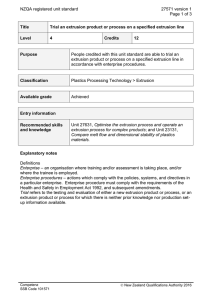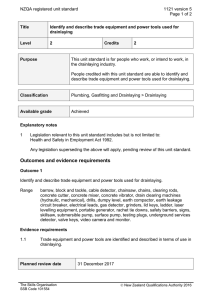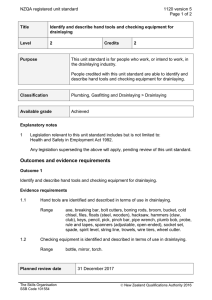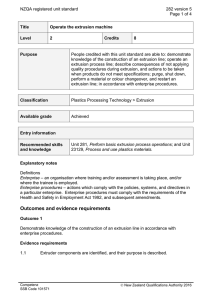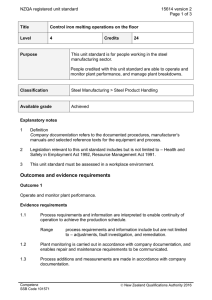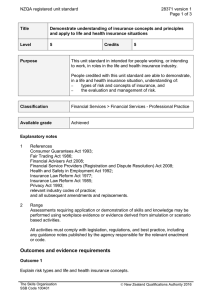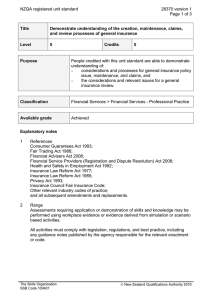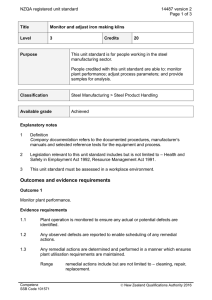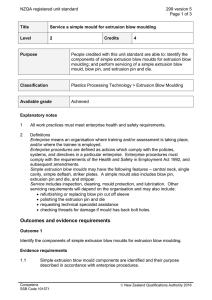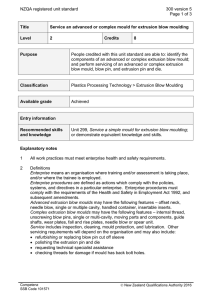NZQA registered unit standard 27631 version 1 Page 1 of 3
advertisement
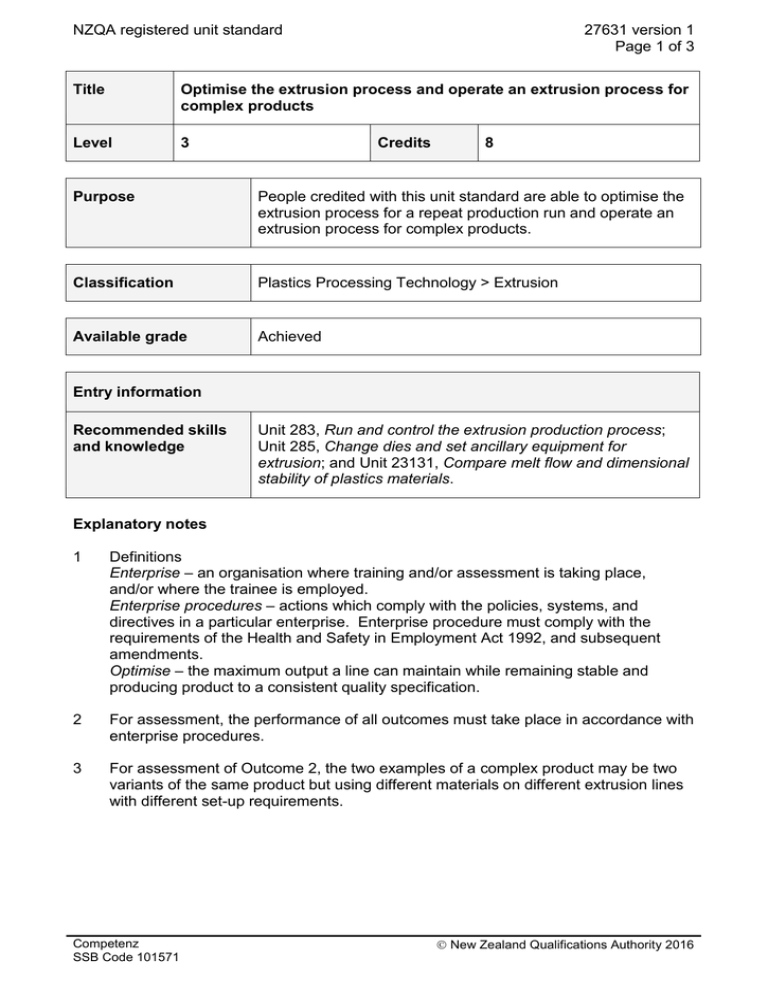
NZQA registered unit standard 27631 version 1 Page 1 of 3 Title Optimise the extrusion process and operate an extrusion process for complex products Level 3 Credits 8 Purpose People credited with this unit standard are able to optimise the extrusion process for a repeat production run and operate an extrusion process for complex products. Classification Plastics Processing Technology > Extrusion Available grade Achieved Entry information Recommended skills and knowledge Unit 283, Run and control the extrusion production process; Unit 285, Change dies and set ancillary equipment for extrusion; and Unit 23131, Compare melt flow and dimensional stability of plastics materials. Explanatory notes 1 Definitions Enterprise – an organisation where training and/or assessment is taking place, and/or where the trainee is employed. Enterprise procedures – actions which comply with the policies, systems, and directives in a particular enterprise. Enterprise procedure must comply with the requirements of the Health and Safety in Employment Act 1992, and subsequent amendments. Optimise – the maximum output a line can maintain while remaining stable and producing product to a consistent quality specification. 2 For assessment, the performance of all outcomes must take place in accordance with enterprise procedures. 3 For assessment of Outcome 2, the two examples of a complex product may be two variants of the same product but using different materials on different extrusion lines with different set-up requirements. Competenz SSB Code 101571 New Zealand Qualifications Authority 2016 NZQA registered unit standard 27631 version 1 Page 2 of 3 Outcomes and evidence requirements Outcome 1 Optimise the extrusion process for a repeat production run. Evidence requirements 1.1 Extruder and line controls are monitored and adjusted to optimise production output and quality, and limitations are reported. Range 1.2 monitoring includes but is not limited to – line speed, heat profile, dimensions, product weight. Common equipment malfunctions are identified, and their correction is described. Range common equipment malfunctions may include – feed throat bridging, excessive head pressure, extruder surging, drive belt slippage, leaking head clamp, faulty temperature controllers, overriding barrel temperatures, haul off speed variation, cutter faults; evidence is required for at least three different common equipment malfunctions. Outcome 2 Operate an extrusion process for complex products. Range complex products may include – finished profiles, decorative shrink wrapped product, foam product, co-extruded product, rigid PVC or PE pipe with dimensions equal or greater than 315mm diameter; evidence is required for at least two different complex products. Evidence requirements 2.1 Extrusion operations are performed and quality inspection procedures are consistently applied in accordance with enterprise procedures. Range Competenz SSB Code 101571 extrusion operations may include – product removal, product finishing, product handling, product packaging. New Zealand Qualifications Authority 2016 NZQA registered unit standard 2.2 27631 version 1 Page 3 of 3 Extrusion equipment is monitored and adjusted to ensure productivity and product quality meets job specification. equipment may include – pay off, cooling and sizing, curing, haul off, printing, marking, measuring, testing, cutting, coiling, belling, packaging; evidence is required for at least six items of equipment. Range Replacement information This unit standard and unit standard 27571 replaced unit standard 284. Planned review date 31 December 2016 Status information and last date for assessment for superseded versions Process Version Date Last Date for Assessment Registration 1 15 September 2011 N/A Consent and Moderation Requirements (CMR) reference 0134 This CMR can be accessed at http://www.nzqa.govt.nz/framework/search/index.do. Please note Providers must be granted consent to assess against standards (accredited) by NZQA, before they can report credits from assessment against unit standards or deliver courses of study leading to that assessment. Industry Training Organisations must be granted consent to assess against standards by NZQA before they can register credits from assessment against unit standards. Providers and Industry Training Organisations, which have been granted consent and which are assessing against unit standards must engage with the moderation system that applies to those standards. Requirements for consent to assess and an outline of the moderation system that applies to this standard are outlined in the Consent and Moderation Requirements (CMR). The CMR also includes useful information about special requirements for organisations wishing to develop education and training programmes, such as minimum qualifications for tutors and assessors, and special resource requirements. Comments on this unit standard Please contact Competenz info@Competenz.org.nz if you wish to suggest changes to the content of this unit standard. Competenz SSB Code 101571 New Zealand Qualifications Authority 2016
